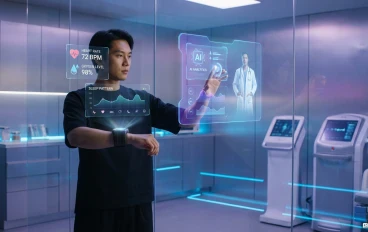
Awareness of a gluten-free diet is the responsibility of healthcare professionals.
Awareness of a gluten-free diet is the responsibility of healthcare professionals.
The rise in gluten sensitivity and celiac disease has made a gluten-free diet not just a trend but a medical necessity for many. Yet, recent studies reveal a crucial gap in understanding among health professionals. This article shines a spotlight on why training health experts on a gluten-free diet isn't just beneficial—it's essential for quality care.
?Why Training Matters
For people with celiac disease or gluten intolerance, managing a gluten-free diet can be daunting. This isn't just about swapping wheat for rice flour; it's a strict and complex regimen. But here’s the issue: many health professionals are not fully equipped to guide patients effectively.
:Key reasons why they need training
- Accurate diagnosis and dietary guidance: Often, symptoms of gluten sensitivity overlap with other health issues. Professionals need skills to differentiate symptoms and recommend precise, safe dietary options.
- Understanding hidden gluten sources: Gluten hides in many unexpected foods and products, from sauces to medications. Many professionals aren’t aware of these, and this lack of awareness can lead to serious health risks for patients who trust their advice.
- Social and emotional support: A gluten-free lifestyle isn’t just physical; it’s a mental challenge too. Adjusting to a restrictive diet affects social life, mental health, and overall quality of life. With adequate training, healthcare providers can offer holistic support and encourage sustainable dietary habits.
:The Current Reality: Gaps in Knowledge
- Several surveys have uncovered shocking results. Many dietitians, nurses, and even doctors admit to knowing only the basics of a gluten-free diet. The problem is that without in-depth knowledge, they risk making recommendations that may harm the patient. This training gap emphasizes the need for structured education programs in medical and nutrition curricula.
?How Training Health Professionals Makes a Difference
With focused education on gluten-free diets, health professionals can gain:
- Confidence in managing gluten-related disorders: Specialized training arms them with knowledge on gluten-free products, recipes, and substitutes. They can confidently guide patients on food choices that are safe and nutritious.
- Awareness of cross-contamination risks: Cross-contact with gluten-containing foods poses risks for those with severe gluten sensitivity. Training teaches health providers how to instruct patients in avoiding cross-contamination, especially in communal or shared spaces like schools, restaurants, and workplaces.
- Better outcomes for patients: When professionals are well-versed in gluten-free diets, patients report fewer symptoms, better adherence to the diet, and an overall improvement in their health and wellbeing.
:Moving Forward: Building a More Informed Healthcare System
- The study highlighting the need to train health professionals on gluten-free diets brings up an issue that can no longer be ignored. As gluten-free diets become a permanent part of medical advice for a growing number of patients, healthcare education systems must adapt. Incorporating gluten-free diet training into medical and dietetics education is a step towards a more informed, supportive, and effective healthcare experience for everyone needing gluten-free care.
:Steps Toward Improving Gluten-Free Education in Healthcare
The push for better gluten-free diet education in healthcare is not just an idea—it’s a call for concrete action. Here’s how healthcare systems, academic institutions, and professionals can make a difference:
- Integrate a gluten-free diet Education into Medical Curriculum: Medical schools, nutrition programs, and nursing training need to include specific modules on gluten-related disorders. These modules could cover everything from diagnosing celiac disease to practical steps in managing gluten-free diets.
- Provide continuing education and workshops. For those already practicing, ongoing education is vital. Workshops and certifications focusing on gluten-free diet management keep professionals updated on new research, products, and best practices. This ensures that they can offer the most current and accurate advice to patients.
- Develop Gluten-Free Resources and Tools: Creating accessible resources like food guides, meal-planning tools, and cross-contamination checklists would make it easier for professionals to support patients effectively. These tools could be shared across practices, clinics, and hospitals to build a more gluten-aware environment in healthcare.
- Encourage Collaboration with Nutritionists and Dietitians: While doctors and nurses play a key role, dietitians often have the expertise to navigate the specifics of a gluten-free lifestyle. Promoting collaboration ensures that patients receive comprehensive care tailored to their dietary needs.
:The Impact of a Gluten-Informed Healthcare Community
Imagine a healthcare environment where every professional is equipped to offer expert guidance on gluten-free diets. Patients with celiac disease and gluten sensitivities would have fewer misdiagnoses, easier access to helpful resources, and a more inclusive healthcare experience. Here’s what that could mean:
- Better patient trust and compliance: When patients feel their healthcare provider truly understands their dietary needs, they’re more likely to trust the advice and stick with the recommended changes.
- Improved health outcomes: For individuals with celiac disease, a single gluten exposure can cause weeks of symptoms and potential long-term complications. Educated professionals help prevent these incidents, improving patient outcomes significantly.
- Reduced healthcare costs: misdiagnoses, emergency visits due to accidental gluten exposure, and extended hospital stays add to healthcare costs. Knowledgeable providers can help reduce these expenses by offering more accurate, proactive care.
:Wrapping It Up
- The findings from this study highlight the need to train health professionals on gluten-free diets as a key step forward in healthcare. For many people, eating gluten-free is not a choice but a necessity—and healthcare professionals are on the frontlines of making this journey manageable. Expanding gluten-free diet education isn’t just about food; it’s about building a healthcare system that meets people’s diverse needs, promotes wellbeing, and fosters a supportive relationship between patients and providers.
:A Call to Action for Policy Makers and Healthcare Leaders
Addressing the educational gap in gluten-free diet knowledge requires not only effort from individual practitioners but also systemic change. Policymakers and healthcare leaders can play a pivotal role in this transformation by:
- Mandating Gluten-Free Diet Training Standards: Establishing national or even international standards for gluten-related diet education in medical training can set a high bar for consistency and quality. Certification programs or required courses on gluten-free management could ensure that every healthcare professional, from primary care doctors to hospital dietitians, is equipped with up-to-date, reliable information.
- Funding Research on Gluten-Related Disorders: Increased research funding can yield better insights into gluten-related conditions like non-celiac gluten sensitivity and how they intersect with other autoimmune disorders. This knowledge directly feeds into developing more effective educational programs for healthcare providers, enhancing their ability to diagnose and treat patients with accuracy.
- Incentivizing Specialized Training: Financial incentives or credits for additional training can encourage more healthcare providers to pursue specialized certifications in gluten-free nutrition and celiac disease management. This way, providers gain a deeper understanding of the dietary and medical nuances of gluten sensitivity, benefiting the entire patient community.
:Building Awareness Beyond the Clinic
While improving education within healthcare settings is crucial, there’s also a growing need to raise awareness of gluten-related issues in broader public spaces like schools, restaurants, and workplaces. Healthcare professionals can be advocates here as well, working to:
- Educate schools and childcare providers: Children with celiac disease and gluten sensitivities face challenges in school settings, from the cafeteria to classroom activities. Health professionals can work with educators to build awareness of cross-contamination risks and the importance of gluten-free meal options. This helps create safer, more inclusive environments for children.
- Collaborate with Food Service and Hospitality Industries: Healthcare providers and dietitians can work together to educate restaurant staff, chefs, and hospitality workers on the basics of gluten-free meal preparation and cross-contact prevention. With the popularity of dining out, especially for people with dietary restrictions, this collaboration can help provide safer experiences for gluten-sensitive customers.
- Advocate for gluten-free options in workplace cafeterias: For adults managing gluten-free diets, eating at work can be a daily challenge. Health professionals can collaborate with companies to offer gluten-free options and educate staff on preventing cross-contamination in communal eating spaces, making workplaces more inclusive for gluten-sensitive employees.
:The Future of Gluten-Free Education in Healthcare
- The study highlighting the need to train health professionals on gluten-free diets underscores an exciting opportunity to create a healthcare culture that’s more responsive and respectful of dietary needs. From curriculum reforms in medical schools to accessible resources for ongoing education, each step forward brings us closer to a future where patients can rely on their providers for accurate and compassionate dietary guidance.
It’s time for healthcare systems to evolve. Patients living with gluten sensitivity or celiac disease deserve not just empathy but informed care that empowers them to live fully without fear of dietary mishaps. With committed effort, we can move toward a world where a gluten-free lifestyle, for those who need it, is seamlessly supported across all facets of life.
:Conclusion
The need to train health professionals on gluten-free diets isn’t just a recommendation—it’s a necessity for the future of healthcare. As celiac disease and gluten sensitivity impact millions worldwide, healthcare providers play a critical role in guiding patients toward safe, healthy lifestyles. By closing the knowledge gap, integrating gluten-free diet training, and fostering collaboration, we can ensure that healthcare is truly inclusive and informed.
- Educated professionals mean safer, more reliable support for those navigating gluten restrictions. Let’s build a healthcare system where dietary needs are understood and respected, helping patients not only manage their conditions but thrive.
































